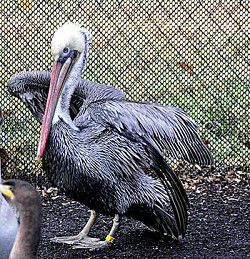Brown pelicans are starving but resist urge to feed them
Published 4:00 pm Monday, February 1, 2010

- Brown pelicans are starving but resist urge to feed them
COLUMBIA -The U.S. Fish and Wildlife Service has been receiving calls about brown pelicans that are either washing up dead on the coast or are exhibiting behavior which is uncharacteristic for the species (such as begging for food, no fear of humans, and eating bread crumbs as handouts). Many of the birds are emaciated, or starving, and this is the reason for their seemingly lack of fear of humans.
California brown pelicans are protected under the Migratory Bird Treaty Act. Thus it is against the law to capture, kill, or possess these birds. Anyone found in violation of this law could face penalties of up to $15,000 in fines and/or six months imprisonment for each violation. If you have information of anyone violating the Migratory Bird Treaty Act please fill in the violation report form at www.fws.gov/pacific/lawenforcement/reportviolations.html, or call your local U.S. Fish and Wildlife Service Special Agent at 503-682-6131.
If you come upon a brown pelican that is still alive but appears to be starving here is what to do:
If the bird is in the area of the coast from the mouth of the Columbia to Yachats please call the Wildlife Center of the North Coast at 503-338-3954. Visit their Web site at www.coastwildlife. org/Home.html.
If the bird is in the area of the coast from Florence south to Gold Beach please call Free Flight Bird Rehabilitation at 541-347-3882. Visit their Web site at www.freeflightwildlife.org
If you find a dead brown pelican, leave it where you found it. Under the Migratory Bird Treaty Act it is illegal to possess any part of a migratory bird, dead or alive. If you find a dead pelican, contact the Coastal Observation and Seabird Survey Team at 206-221-6893 or visit their Web site at http://depts.washington.edu/coasst.
Finally, do not feed these birds. This will only lead to further habituation of these birds to handouts from humans. It is important that these birds continue on their migratory route.
After the breeding season in California and Mexico, California brown pelicans migrate north throughout California, Oregon, Washington and British Columbia in the summer months and usually begin to head back south in large numbers in October. This year, however, a large number of pelicans remained along the Oregon coast and around the Columbia estuary through the winter. Winter storms and high winds have limited the pelicans’ ability to hunt and dive for food. These and other unknown factors contribute to the pelicans’ behavior to beg for food. Biologists discourage hand-feeding pelicans as their diet is very particular. Good intentions of feeding pelicans the bones and heads of fish can cause damage to the pelican’s throat pouch. Also fish bait can be contaminated with harmful bacteria or may be treated with chemicals to promote better fishing or preserve the bait, but it can make a pelican very ill.
For more information on U.S. Fish and Wildlife Service, visit (www.fws.gov).









